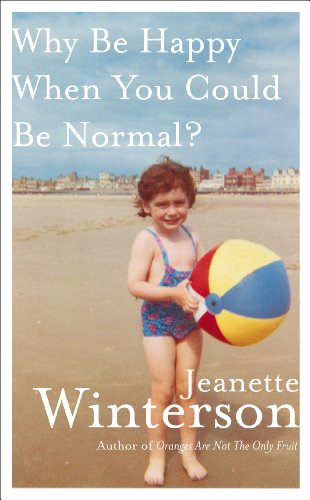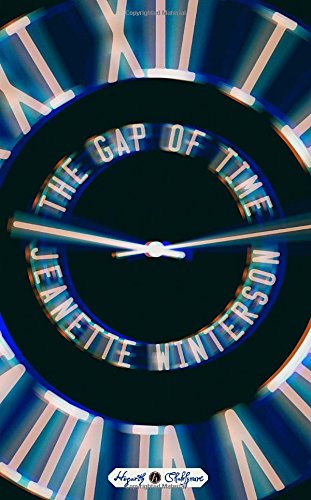Book Reviews: Jeanette Winterson
I enjoyed two of Jeanette Winterson’s books recently.
Why be Happy When You Could be Normal?
Jeanette Winterson was born in Manchester in 1959. She was adopted by strict Pentecostal Evangelist parents and brought up in Accrington, Lancashire. Winterson’s childhood was Dickensian in it’s brutality–locked out of the house or into a coal cellar, shown no love, subject to the petty tyrannies of a bully of a mother. Her mother was devoutly religious but rather than seeing religion as a means of spreading love and understanding, she saw it as a way to chastise people. She was a misanthrope, a hater of mankind.
This book is her autobiography, the title is the literal response of the mother when Jeanette told her that she is happy loving another woman. In using a quote from a parent as a title, and in the Northern industrial setting of a childhood rescued by innate intelligence, a love of learning, and a university scholarship, her story is reminiscent of that of Fiona Hill’s in There is Nothing for You Here, reviewed previously.
Like Hill, Winterson turned her back on the narrow confines of her working class origins:
I didn’t want to be in the teeming mass of the working class…. I didn’t want to live and die in the same place with only a week at the seaside in between. I dreamed of escape — but what is terrible about industrialisation is that it makes escape necessary. In a system that generates masses, individualism is the only way out. But then what happens to community — to society?
.
.
On the top of the hill looking out over the town I wanted to see further than anybody had seen. That wasn’t arrogance; it was desire. I was all desire, desire for life.
And like Hill, she is aware of the wider implications of the declines of Britain’s once thriving Northern regions:
In the North people met in the church, in the pub, in the marketplace, and in those philanthropic buildings where they could continue their education and their interests. Now, maybe, the pub is left–but mainly nothing is left.
Her brilliance as a writer was shaped by an escape into fiction and poetry in the town library–a place of shelter from the storm of home life.
I had no one to help me, but the T. S. Eliot helped me.
So when people say that poetry is a luxury, or an option, or for the educated middle classes, or that it shouldn’t be read at school because it is irrelevant, or any of the strange stupid things that are said about poetry and its place in our lives, I suspect that the people doing the saying have had things pretty easy. A tough life needs a tough language – and that is what poetry is. That is what literature offers – a language powerful enough to say how it is.
It isn’t a hiding place. It is a finding place.
The story of her life plays out in real time in the latter parts of the book. She writes a fictional account of her life in her best selling debut novel Oranges Are Not the Only Fruit which her adopted mother is ashamed of and, when they finally meet, her birth mother inordinately proud.
Winterson has now written more than a dozen works of fiction. The most recent I read is the stunning retelling of Shakespeare’s late drama: The Winter’s Tale.
The Gap of Time
Winterson’s novel launched the Hogarth Press Shakespeare project which now includes seven novels that retell works by William Shakespeare for modern audiences.
To prepare, I read The Winter’s Tale (for the first time) and enjoyed the two-part drama, separated by a gap of sixteen years, which Shakespeare bridges in Act IV, Scene i with Time as a a chorus, hence the book title:
Now take upon me, in the name of Time,
To use my wings. Impute it not a crime
To me or my swift passage, that I slide
O’er sixteen years and leave the growth untried
Of that wide gap…
While those who’ve read the play with benefit from an understanding many references and asides, the reader of Winterson’s novel is helped by a brief summary of “The Original” in her opening chapter.
The ‘cover version’ she writes adheres to characters and plot, but transposes the time from the Medieval Sicily and Bohemia to London in 2008, reeling from the financial crisis. At first glance, this seems improbable. However, the jealous Leontes, King of Sicily in the original, is re-cast as Leo Kaiser (geddit?), a disgraced banker, rebounded as a Bobby Alexrod (Billions) style leveraged buy-out plutocrat.
Many of characters names match the original;
- Mamillius, Leontes’ son = Milo
- Polixenes, King of Bohemia = Xeno
- Florizel, Polixenes’ son = Zel
- The old Shepherd = Shep
- etc.
Interestingly, two of the characters who retain their Shakespearean names unaltered are the heroine Perdita and, most amusingly, the lovable rogue Autolycus, a shady used car salesman!
As far as the plot and characters map the original, it’s a clever book. However, what, for me, elevated it into the stratosphere as one of the best books I’ve read, ever, is the scintillating prose.
Example, a meditation on loss:
My wife no longer exists. There is no such person. her passport has been cancelled. Her bank account closed. Someone else is wearing her clothes. But my mind is full of her. If she had never lived and my mind was full of her they’d lock me up for being delusional. As it is, I’m grieving.
.
.
EVERYTHING MUST GO.
That’s fine by me. Take it all away. The cars, the people, the goods for sale. Strip it back to the dirt under my feet and the sky over my head. Turn off the sound. Blank the picture. Nothing in between us now. Will I see you walking towards me at the end of the day? The way you did, the way we both did, dead tired, coming home from work? Look up and we see each other, first far away, then near? The energy of you in human form again. The atomic shape of your love.
The Gap of Time, p. 19-20
In addition to expressing herself in these terms, Winterson weaves in references to the play, which is why a reading of Shakespeare enhances an appreciation of this book. I probably missed many of these references, but a couple stood out, such as this line used as a chapter title on p.75
Is goads, thorns, nettles, tails of wasps.
The Winter’s Tale, Act I, Scene ii
And multiple references to this jealous rant by Leontes:
Is this nothing? Why then the world and all that’s in’t is nothing,
The covering sky is nothing, Bohemia’s nothing,
My wife is nothing, no nothing have these nothings,
If this be nothing.
The Winter’s Tale, Act I, Scene ii
The first reference in the novel immediately follows the quote on p. 20 above:
“It’s nothing,” she said, when she knew she was dying.
Nothing? The the sky is nothing and the earth is nothing and your body is nothing and our lovemaking is nothing . . .
And again:
He interrupted her. “It’s nothing. But these nothings . . . they . . .”
These nothings are nothing. But the sky is nothing, the earth is nothing. I am nothing, love is nothing, loss is nothing.
The Gap of Time, p. 230
What some have called the most romantic lines in English literature:
A cause more promising
The Winter’s Tale, Act IV, Scene iv
Than a wild dedication of yourselves
To unpath’d waters, undream’d shores, most certain
To miseries enough; no hope to help you,
But as you shake off one to take another;
Nothing so certain as your anchors…
Is referenced at the moment of adoption:
It was a map of discovery. There were no more North Poles, or Atlantic Oceans or Americas. The moon had been visited. And the bottom of the sea.
But she was setting out with the blank sheet and compass of herself.
Unpathed waters. Undreamed shores.
The Gap of Time, p. 155
Time as a theme is referenced in ways large and small:
…they go back to bed to sleep and the city dreams itself into another day.
…Superman is powerful enough to belt the earth like Puck on speed and turn back time.
The evening was cooling into night.
The Gap of Time, pp. 237, 197, 230.
Plus, the broken-down car Autolycus tries to sell is a DeLorean — Back to the Future!
Throughout the book there are recursive references to Shakespeare, the title of the novel, and Winterson’s other works.
The final chapter is her meditation on the theme of forgiveness on the later play’s of Shakespeare, and how in The Winter’s Tale “the past depends on the future just as much as the future depends on the past.” She detects the seeds of psychoanalysis in decoding “how the past mortgages the future, or that the past can be redeemed.” Concluding, “And time, that sets all limits, offers our one chance at freedom from limits.”



No Comments so far
Leave a comment
Leave a comment
Line and paragraph breaks automatic, e-mail address never displayed, HTML allowed:
<a href="" title=""> <abbr title=""> <acronym title=""> <b> <blockquote cite=""> <cite> <code> <del datetime=""> <em> <i> <q cite=""> <s> <strike> <strong>